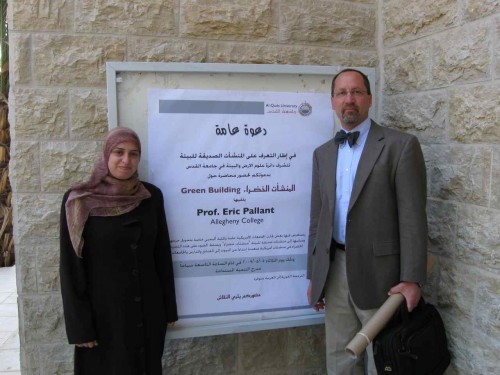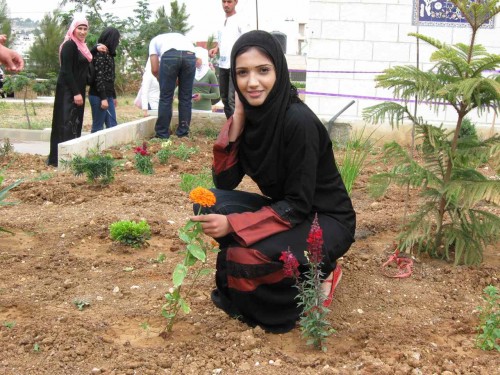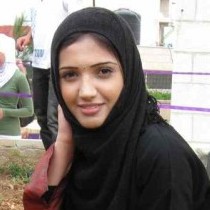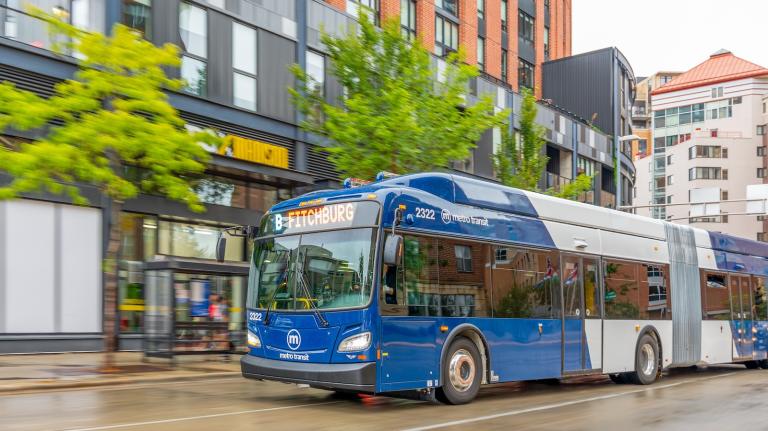 At the West Bank’s first green-building conference.Courtesy Eric Pallant
At the West Bank’s first green-building conference.Courtesy Eric Pallant
Read more about Eric Pallant’s eco-explorations in the Middle East.
Al Quds University in Abu Dis, Palestine, hosted the first Green Building conference in the West Bank this week. It wasn’t just students who showed up — there were suits, too. Forty-nine people attended, and the audience held a fair share of regional environment ministers, deans, and reporters. I was the invited keynoter.
It is a difficult thing to fly into a developing country — the United States Department of State coordinated my visit — and to know I burned up more carbon doing so than most of the students in the room consume in a month. The majority live at home with their parents in small apartments, commute to campus in city buses or taxis, shower in water heated by the sun, and, come to think of it, consume on average one-fifth as much water as their Israeli neighbors and one-tenth as much as an American.
Even considering what materials to recommend for building new green homes kept me awake for weeks before I arrived. Stone, the traditional building material, lasts forever (two bonus points), but quarries on the West Bank generate some of the worst particulate matter in a region where the air is not much better than Beijing’s. Wood? Forget about it. There are no forests to speak of. Steel and glass? When I considered the energy required to mine the iron, manufacture the steel, and ship it from China, it didn’t seem like a better solution. I suggested adobe. They’ve been using it in Jericho for 10,000 years. If it is good enough for the oldest continuously inhabited city in the world, it probably is worth a second look. Then again, I’m not aware of a lot of adobe highrises.
 In the native-plant garden.Courtesy Eric PallantThe really interesting information emerged when I was finally done talking. Scientists on the Al Quds faculty were already running a project treating university wastewater to make it drinking quality and then pumping it around campus for irrigation. An environment minister told me his ministry is constructing a model green building with ground source heating and cooling in Ramallah. A large wind turbine will produce a hospital’s electricity in Hebron. And my month-old suggestion that I work with students when I was on campus to create a garden of native plants had nearly been completed before I even arrived. In fact, after my talk all the participants trekked to the garden at the center of campus. With the TV cameras rolling and flowers in the backdrop, I got my official interview alongside the Dean of the University and the Cultural Affairs Officer of the U.S. Consulate.
In the native-plant garden.Courtesy Eric PallantThe really interesting information emerged when I was finally done talking. Scientists on the Al Quds faculty were already running a project treating university wastewater to make it drinking quality and then pumping it around campus for irrigation. An environment minister told me his ministry is constructing a model green building with ground source heating and cooling in Ramallah. A large wind turbine will produce a hospital’s electricity in Hebron. And my month-old suggestion that I work with students when I was on campus to create a garden of native plants had nearly been completed before I even arrived. In fact, after my talk all the participants trekked to the garden at the center of campus. With the TV cameras rolling and flowers in the backdrop, I got my official interview alongside the Dean of the University and the Cultural Affairs Officer of the U.S. Consulate.
It was the students who really carried the day, however. They organized a green building exhibit that filled a small convention center. They had built a wind turbine from a disassembled vacuum cleaner, which they spun by hand to light three small lamps. They had a motion sensor turn on a light inside a small Styrofoam house and turn it off again in 20 seconds. They were making paper from discarded stationery and had sewn bags and purses from plastic bags they recycled themselves. They built models of green roofs, demonstrated a small photovoltaic panel, and had three old Coke bottles filled with biodiesel they had made from used falafel oil. One wall was covered by large panels of environmental art, and the welcome to the exhibition was drawn in Arabic across twenty meters of floor space using only rich red soil to form the letters.
To be frank, today’s exhibition will never make the headlines of the Western media. Where’s the thrill in optimism in a region that for centuries could be relied upon instead for conflict? But I’ve seen it with my own eyes. A new generation of youth is preparing to make Palestine a greener place to live. In two days on campus, no one ever asked my religion. When it comes to caring for the planet, it did not seem to matter.




